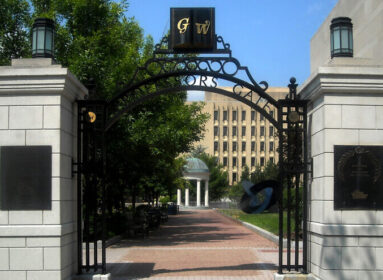By Rebecca Levy ’12, Molly Cohen ’12 and Sean Snyder ’13
This spring break, 15 Trinity students accompanied by Hillel Director Lisa Kassow and Cantor Mijal Lacher spent their vacation doing something a little different. Instead of relaxing on the beach, they traveled to Montevideo, Uruguay on Hillel International’s Alternative Spring Break and engaged in various forms of community service along with students from University of Illinois and Wellesley College.
Activities included interacting with kids at “Merendero Nuevo Amanecer” a soup kitchen created by a local couple in a shanty-town; building houses with an NGO called “Un Techo Para Mi Pais” (A Roof for my Country), painting the interior of two shelters for victims of domestic abuse, and making Passover packages of food for poor Jewish families and the elderly at Chabad, the Lubavitch Jewish Center. The trip, funded in part by advisory fund grants from the Jewish Community Foundation of Greater Hartford, was organized by Hillel Uruguay, which as the only Hillel in the country operates like a Jewish community center for 17-30 year olds. The final day of the trip included site seeing, visiting the Holocaust Memorial, and attending Shabbat services at either an Orthodox or Conservative synagogue in Montevideo.
Several members of the group talked about the trip and its effect on them.
Rebecca Levy ’12:
For me, the most powerful experience was working with “Un Techo Para Mi Pais” and building a transitional house for a family living in a shantytown. It really opened my eyes to the realities of another part of the world and made me appreciate how lucky I am to live in the U.S. and go to Trinity College. This family was all smiles and had a positive outlook on life as we built a house for them that did not have electricity or plumbing – just four plain wood walls and a cement floor. For people who have nothing, they were cheerful, kind and generous, cooking food for us throughout the days we worked there. This was my first major community service experience, and it was incredibly inspiring.
Sean Snyder ’13:
This organization has been in Uruguay for six years and has built more than 1200 homes. Our group split into three teams and over the course of two days of nine hours of manual labor we built three transitional homes. Although we tired and waned under the sun, there was a stronger force pushing us to continue to work, the bond we developed with our individual families. We sweated together, laughed together, and shared Mate together (a traditional herb drink of the area which when shared represents a growing friendship.) The families lacked many of the materialistic items that Americans believe they cannot live without, and yet they were still happy because they are still truly in touch with what is important to them, their ties to their families and communities. When we had finished the homes and saw how thankful they were, we too began to realize what truly is important to us in our lives. That was the greatest gift they could have ever given us.
Molly Cohen ’12:
The experience that had the greatest impact on me was our visit to the soup kitchen in the shantytown to play with children. I was amazed at the generosity of the couple who began the soup kitchen, using their own resources to provide local children with daily meals, a safe place to play and get help with their homework – basic necessities that many of these children do not receive at home. Around sixty or seventy children came after their school day and we interacted and played with them. These children, who have to face a struggle everyday to survive, were bursting with energy and enthusiasm. Despite the language barrier, everyone in our group connected with at least one child. As I looked around, I saw my peers doing art projects, playing basketball, blowing bubbles, dancing, and simply sitting and talking with the children. It was easy to notice the excitement in both the children and the students. I began talking with a young boy who wanted to do an art project that he found on the back of one of the construction paper covers, and I helped him make it. He was so happy and appreciative that when we finished the project he handed it to me and told me to keep it. It was a really heartwarming experience, and made me realize the impact that a single person can have on a child. The visit had an impact upon our group, because the first thing most of us said when we got on the bus to leave was that we wanted to go back. It made me acutely aware of the effect that poverty has upon children, and the degree of nurturing that children need that is not being met around the world. Even if it begins with something small, one person can make a difference. Yamadu and Ana, the couple who began the soup kitchen are perfect examples of normal people working for the benefit of others, and how significantly they have changed these children’s lives.
Rebecca Levy ’12
Another memorable experience of the trip was attending Shabbat services at the conservative synagogue on Friday night in Montevideo. Here we all are, this group of people who speak different languages, but we all sing the same familiar prayers and melodies, believe in the same things, and have a common language in Judaism. It was amazing to look around and just see this group of Jews, praying together and singing together as one entity even though we all have different backgrounds. There were various points in the service where tears came to my eyes, and it was just mind blowing.
Cantor Mijael Lacher
Our fifteen Trinity students understood that they were “ambassadors of their country” for residents of shantytowns who had never interacted with Americans before. As a Latin American Jewish educator back in my own continent, it was remarkable to share my American experience with local peers, but also to learn from our students as we reflected throughout the week on the meaning of what we were doing in a Jewish context.
Hillel Director Lisa Kassow adds:
The words from Pirkei Avot, Ethics of the Fathers: “It is not your responsibility to finish the work [of tikkun olam, perfecting the world], but you are not free to desist from” sums up our whole adventure. We knew that what we could accomplish in a week was a drop in the bucket when faced with such overwhelming poverty, but we opened our hearts to strangers and felt we made a genuine difference in the lives of individuals we will never forget.








 Southern New England Jewish Ledger
Southern New England Jewish Ledger










Comments are closed.